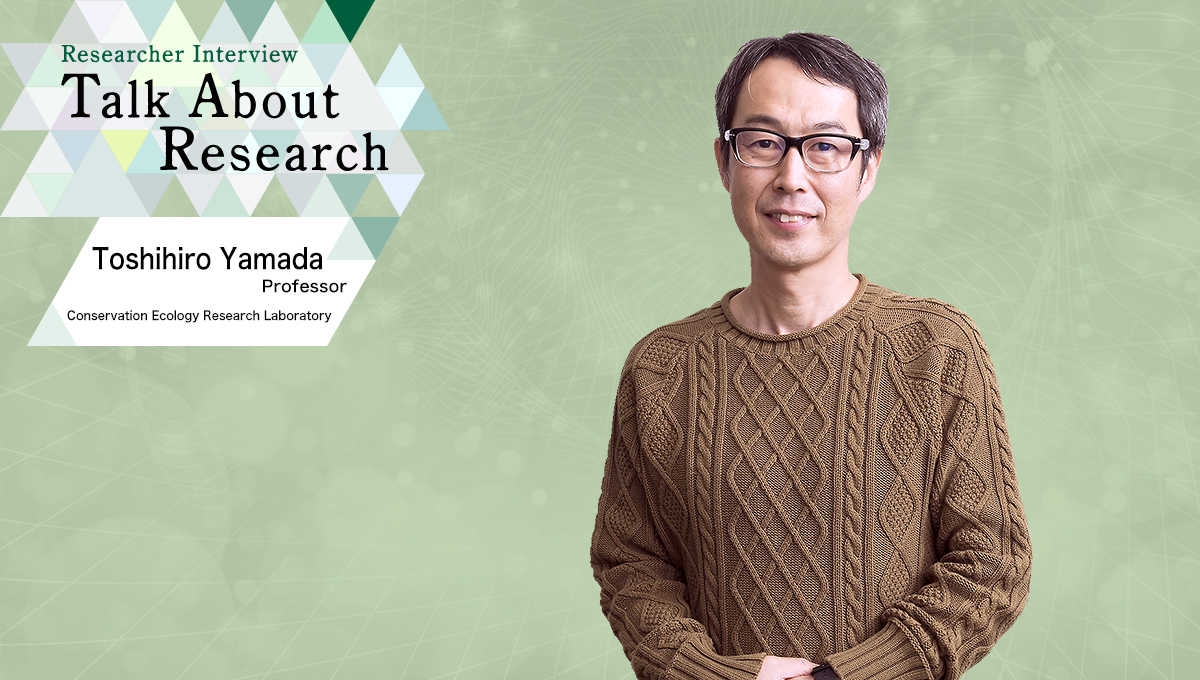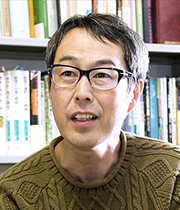Conducting a long-term research on the effects of logging on tropical forests
Professor Yamada specializes in ecology. His main focus is on tropical ecosystems especially on plants, and except for this year (2020) when the COVID-19 pandemic struck, he has been visiting Myanmar, Malaysia and other SE Asian countries once every year each to continue his field research.
According to Professor Yamada, tropical rainforests are a treasure trove of biodiversity.
“It is said that 80% of the terrestrial biodiversity is concentrated in tropical rainforests. This means that protecting the biodiversity in tropical rainforests should be the key to protecting biodiversity on a global level.”
Professor Yamada encountered a tropical rainforest when he was a student. He was overwhelmed by the scene during his first research but gradually became fascinated and eventually became so immersed in it that he did not want to return home. Additionally, his research style is based on fieldwork in which he spends time in tropical rainforests counting the number of seeds, seedlings (plants that have just sprouted from seeds), and trees and turning his findings into data. Professor Yamada describes this as “like a national census of the tropical rainforest.” He says that through his work, he becomes able to predict how the tropical rainforest we see now will change in the future or remain the same.
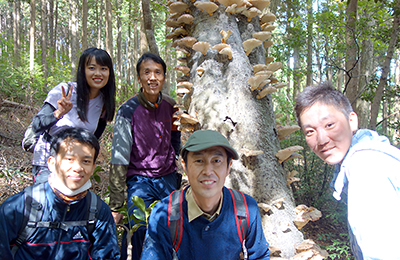 With a strange mushroom (Omphalotus japonicus)
With a strange mushroom (Omphalotus japonicus)
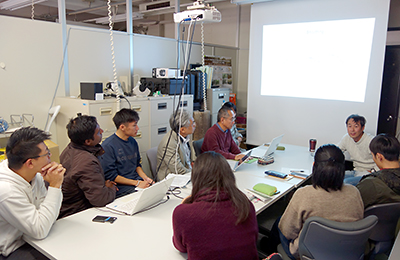 Seminar at a research lab
Seminar at a research lab
Professor Yamada says, “More than half of the tropical forests have been commercially logged. Commercial logging is the main cause of tropical forest degradation, and the number of tropical forests subject to logging is expected to increase in the future.” The professor points out that the degradation of tropical forests is one of the global environmental problems, and it is a problem that has a great deal to do with global warming and biodiversity loss. However, it has not been clear how much of an impact this would actually have. Hence, Professor Yamada took on the challenge of surveying tropical forest tree species and has published a number of research results in various international journals.
As for the “effects of logging on tropical forest dynamics and biodiversity” the following points have been elucidated by his studies.
“The results of my study of forests in Malaysia that were logged about 60 years ago showed that tree biodiversity was lower in logged forests than in unlogged forests and that there were large differences in the species that made up the forests between the two. In other words, it is clear that biodiversity is not being able to fully recover even 60 years after logging and will require a much longer time to recover.”
The results of his research over many years, including surveys and data collection, have been recognized as contributing to the advancement of ecology.
He was awarded the 2015 Oshima Award by the Ecological Society of Japan.
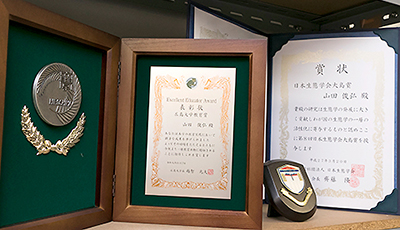
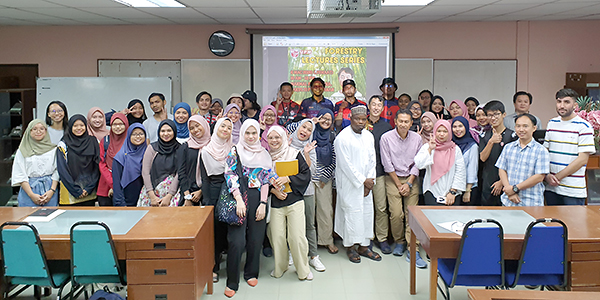 With students after a lecture given at University Putra Malaysia
With students after a lecture given at University Putra Malaysia
A field that requires long-lasting researches
—Professor Yamada keeps solving the questions of a mysterious world
The dynamics of the rainforest is very slow to our human senses. However, a certain number of trees die, and a certain number of trees germinate each year, and the process of renewal continues slowly but certainly. To capture the slow progress of the dynamics on a 100-year time scale, several decades of observation of the forest are required.
“A long-term observation of a tropical forest requires patience. It takes time and labor to compile data, and it is a characteristic of this field that it requires long-lasting researches.” Professor Yamada adds smiling, “Ecosystems are a concept, so even if you actually go into nature and try to see ecosystems, it is hard to see how they are connected. That is both the difficult and interesting aspect of this field.”
On top of that, in the harsh environment of the tropical rainforest, researchers are exposed to the risk of health threats.
“In Southeast Asia, there is an infestation of endemic diseases that do not exist in Japan. Malaria is one of them, and of course, we never neglect our efforts to avoid such risks. Still, I contracted malaria during my research on the island of Borneo, Indonesia in 2002.”
Professor Yamada is continuing his study knowing that he is exposed to these risks.
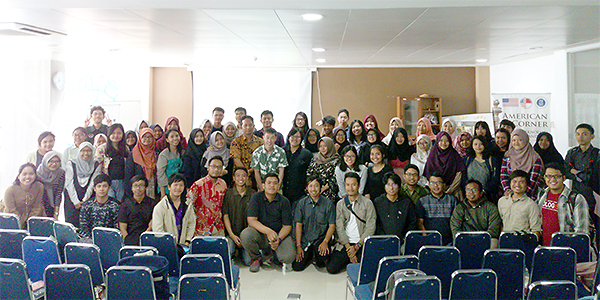 With participating students after a lecture
With participating students after a lecturegiven at Bandung Institute of Technology in Indonesia
Professor Yamada also says that the best part of his research is that “intuitions and common senses are betrayed.” He keeps explaining, “In agriculture, for example, as an intuition, you may feel that since agriculture is also close to nature and necessary for our survival, agriculture is a good thing and there are no bad elements. But as the American biologist Garrett Hardin pointed out in his article, The Tragedy of the Commons, agriculture has also become a behavior that destroys the environment, and if we are not careful, we may endanger our own lives by agriculture that is intended to protect our own lives.”
According to the professor, it is estimated that there are 8.75 million species of living organisms on earth, but only 1.25 million of them have been discovered and named. Most of them are unknown. WE DO NOT KNOW MUCH, which is the level of science in the 21st century that we live in.
Hence, there are countless issues that are left unresolved.
- Why are there so many species?
- How much biological significance (or lack thereof) is there in distinguishing species?
- Is there a global or regional pattern to diversity?
- What exactly is biodiversity to begin with?
He says that his research is to give an answer to these questions.
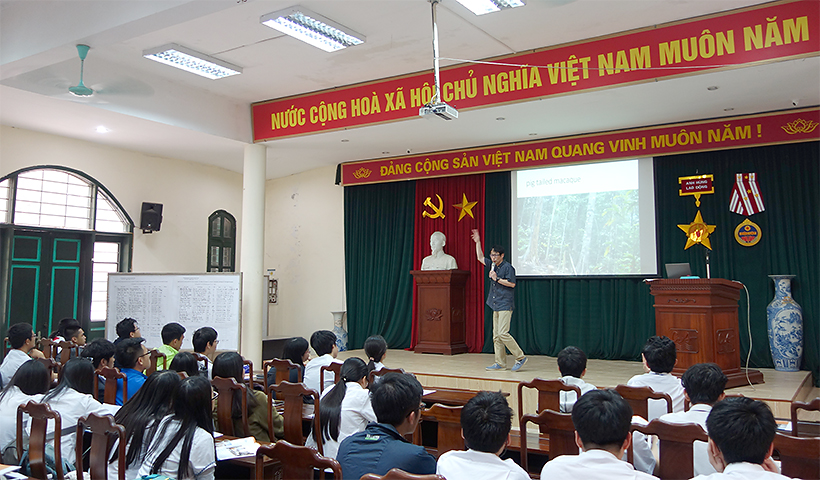 A visit to a high school in Hanoi, Vietnam
A visit to a high school in Hanoi, Vietnam
How should we deal with biodiversity?
By seeking the answer to the question,
I want to invite humanity to change its way of thinking!
Conversely, how seriously do we think about biodiversity?
“Awareness and understanding of biodiversity is not necessarily advancing. By the way, why are we failing to understand biodiversity? A philosopher, Timothy Morton’s view of this was that the spatio-temporal extent of biodiversity is too great for the human brain to comprehend. Living organisms were born four billion years ago and took four billion years to create the diversity we see today. Meanwhile, we humans are always short-sighted in terms of time, and even memories of 10 years ago are vague. According to an anthropologist, Robin Dunbar, the human brain can only imagine things up to approximately 100 years ago. Things that happened more than 100 years ago are in an unknown territory that we cannot depend on our memory or imagination to comprehend. Biodiversity created over four billion years, which is an unimaginably long period of time, may indeed be beyond human comprehension.”
“I want to understand these objects that are almost impossible for humans to comprehend in my own way.”
“I want to share conclusions I find with other people.”
- These are the motivations that drive Professor Yamada to his research.
When conducting research, Professor Yamada believes in exploiting all of his knowledge, regardless of whether it is in the humanity sciences or natural sciences and utilizing all kinds of tools necessary without hesitation. “I would like to draw conclusions that are unacceptable to common sense after conducting researches in a standardized manner. It is my great ambition to advance ideas that no one else has found or thought of.”
For this reason, the professor focuses not only on conducting a research but also on publishing the results.
Together with Professor Toshinori Okuda, who also belongs to Program of Life and Environmental Sciences, he is involved in policy research for the Ministry of the Environment and continues to disseminate information not only through university lectures but also to outside university through numerous books, online articles, and YouTube videos.
“All of these venues and media deal with familiar themes for thinking about biodiversity, such as issues of threatened species, forest protection, and food issues. Please take a time to read them. The contents are a bit surprising, considering the conventional wisdom,” said the professor.
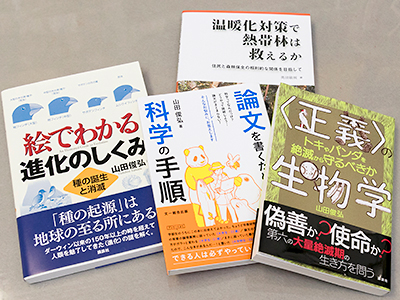
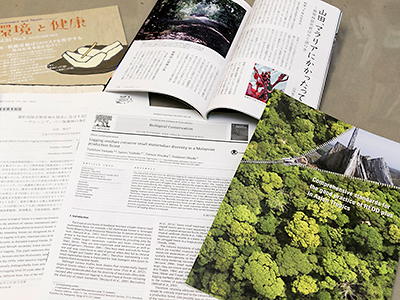
By publishing research findings and communicating the ideas he has discovered, the professor hopes to “change the way people think” and “change the way people view the world.”
“I think it is important to recognize that everything around us is the environment. Whether it is clean or dirty, whether we like it or not, we need to accept and recognize all that is around us and think carefully about what we can do from there. Having said that, I think it will take some time for most of humanity to start thinking like that.
Even if my generation cannot come up with an answer, I think it is important that the next generation and generations after that will do whatever they can to convince the people of their time.”
■YouTube
- Why do we conserve forests? [Yume Navi Talk]
- Enhance your knowledge -Hiroshima University 100 special lectures-
- Hiroshima University IGS 10-minutes lecture series
■Kodansha Online Articles
- When Sea Otters Disappear, the Ocean Dies—The Collapse of the Ecosystem Triggered by the Extinction of Just One Species
- Producing more foods does not solve the food shortage:
Easy explanation of “the tragedy of the commons” - Humans are driving one million species to extinction! a number of species is disappearing without names.
Tragic situations revealed by an intergovernmental organization - Say No to predatory journals! But there are some reasons for the spread of such journals.
- Approximately 160 years after “the Origin of Species,” is it true that we have not been able to define “species”?
To separate or to merge, that is the question.
■Bun-ichi Sogo Shuppan Online Articles
- The World of Tropical Forest Studies
A Close Call with Malaria! The Struggle of a Tropical Forest Researcher - How Do You Keep Insects Away? Researchers Tested the Wearable Insect Repellent Scoron® in the Malaysian Jungle
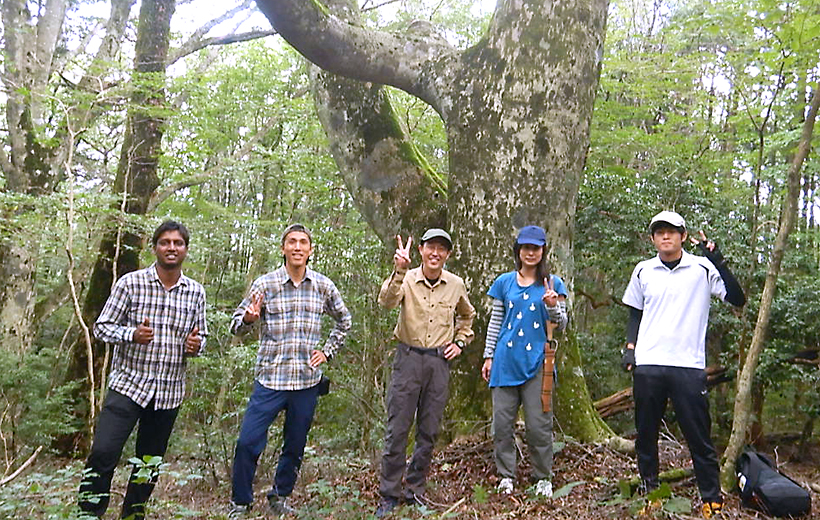 With a giant beech tree
Opened on July 14, 2021
With a giant beech tree
Opened on July 14, 2021

